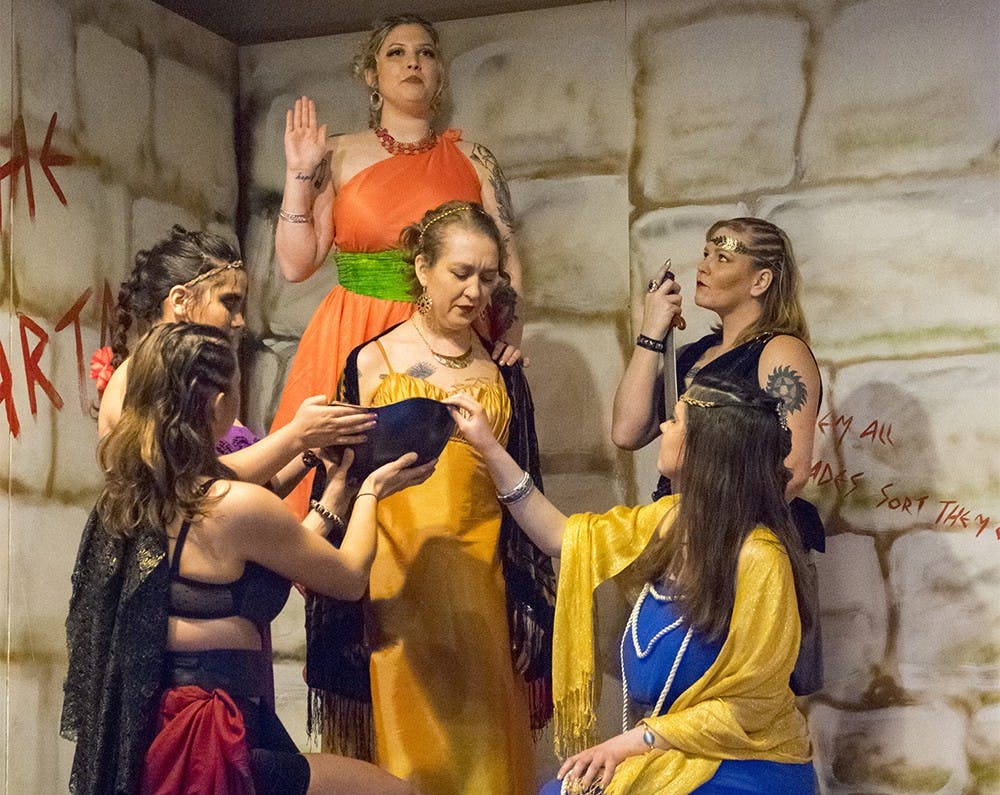“Lickistrata” is the name of the new ice cream flavor Zeitgeist Organics is making for the Monroe County Civic Theater’s next show. With honey, almond and pomegranate, the pink-tinged treat evokes Greece, where “Lysistrata” was written by Aristophanes in 411 BC.
The play’s namesake character is an Athenian woman who takes on the task of ending the Peloponnesian War between Athens and Sparta. She does this by persuading women all over Greece to pledge to withhold sexual privileges from the men in their lives in order to force a treaty.
“I like her because she’s so strong,” Sarah Mae Ruggles, who plays Lysistrata, said. “She always says and does the things that are on her mind without worrying if it’s going to make her unpopular or make the men angry. She’s not scared of the men in power, and I think nowadays it’s easy to be scared. We’re all taught to be demure, and Lysistrata is not that.”
Ruggles is the type of woman who apologizes about everything, even for things that aren’t her fault. She appreciates that Lysistrata is not that type of woman. In a hot pink robe draped in Greek style and platform shoes, Lysistrata takes a stand for all women to do the same.
Under Lysistrata’s urging, the women take over the Acropolis. The women still at home put on makeup, slip into their most alluring dresses and refuse to let their men touch them until they see a change. This resonates as empowering, modern day feminism, but in ancient Greece it would have been taken as a joke, Ruggles said.
“It was absurd fiction for them,” Roy Sillings, who plays one of the Athenian ambassadors, said. “It was intended to be ridiculous, the notion that women would be doing this. They did the same thing with birds and frogs and clouds.”
Another major theme that the play discusses is war. Sillings said during the Vietnam era, “Lysistrata’s” popularity surged because of its anti-violence sentiments.
People who were growing tired of the war and of the people who started it identified with the women of Greece, who were tired of their men being away from home for months at a time to wage a war that had no end in sight.
“Aristophanes was a great aristocrat, and he thought this was being perpetrated by demagogues,” Sillings said. “We have that notion in common, that societies perpetuate wars for political and economic reasons.”
What sets apart this rendition of “Lysistrata” from its ancient origins the most is the venue. In ancient Greece, the play would have been performed outside in the middle of the town, and everyone would go to see a program of plays that lasted all day, Sillings said.
Usually consisting of three comedies and four tragedies per day, the week-long theater festival was part of a religious ceremony honoring the god Dionysus. Even the slaves were set free to take part in the celebrations.
“It’s a very different social context, but it picks up themes from that distant time and culture,” Sillings said. “In Athens at that time, the beginning elements of the modern world were being discovered. Everything was happening, it was a flowering of human spirit. It’s amazing to see how much we can understand, how the issues are very accessible to the modern mentality.”






